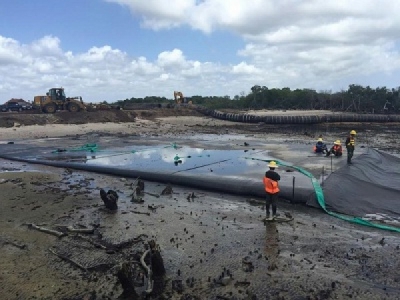
Posted on October 20, 2016
By Weitere Mwita, The Star
The construction of the first three berths at the proposed Lamu port has gained momentum, putting in motion the implementation of the Sh2.5 trillion Lamu Port Southern Sudan-Ethiopia Transport project.
This is after a more than four-year lull caused by funding challenges.
The deepening of the docking area for ships by 17.5 metres kicked off at the weekend, Transport PS Irungu Nyakera said yesterday.
“Dredging has started. A 10,000-tonne class vessel is on site and the dredging will take two years,” Nyakera told the Star.
The dredging is part of the $478.9 million (Sh48.6 billion) deal with China Roads and Bridge Corporation the contractor signed with the Kenya Ports Authority in August 2014, for the construction of the first three berths.
“The first berth will be ready by June 2018,” Nyakera said.
The latest development is a positive indicator for the Lapsset project commissioned early 2012 by former President Mwai Kibaki.
South Sudan’s President, Salva Kiir, and former Ethiopian PM Meles Zenawi attended the ground-breaking ceremonies for Kenya’s second largest transport and infrastructure project.
“Lapsset has the highest priority within government. To realise this, we need private sector partnership,” Nyakera said.
About Sh10 billion has been allocated to the project in this year’s budget.
The viability of the project has been threatened by new infrastructure projects in Ethiopia, Uganda and Tanzania.
They include the 700km Ethiopia (Addis Ababa)-Djibouti railway line valued at $4billion (Sh405billion), which links the country to the port of Djibouti. The port handles about 80 per cent of Djibouti’s international trade volumes.
The decision by Uganda to ditch the 1,500-kilometre Hoima-Lokichar-Lamu crude oil pipeline deal also dealt a major blow to the Lapsset project.
Uganda has signed a deal with Tanzania for an oil pipeline from Hoima to Tanzania’s Tanga port.
Nyakera, however, affirmed government’s commitment to the project, saying the multibillion-shillings Lapsset corridor will be developed under a public-private partnership framework.
The programme includes the construction of the remaining 29 berths at the 32-berth port estimated at $5.3 billion (Sh537.4 billion).
The government has been using trade forums in Nairobi to woo investors into the mega project which involves building of the port, roads, pipeline, among others.
During the Sixth Tokyo International Conference on African Development held between August 27 and 28, Japan pledged to commit $10 billion (Sh1.014 trillion) for infrastructure projects, to be executed through cooperation with the African Development Bank.
Kenya and South Africa signed a memorandum of understanding with South Africa on the implementation of Lapsset corridor projects during last week’s visit by President Jacob Zuma.
Source: The Star





